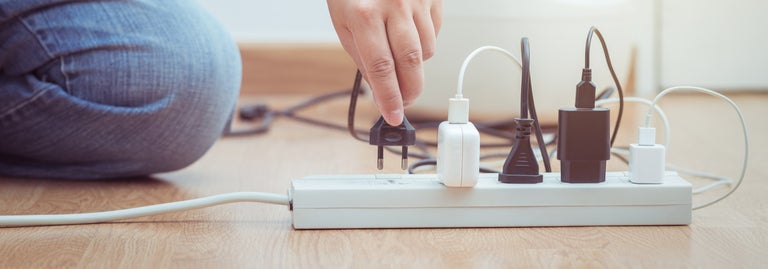A large number of New Zealanders will have started working from home this month with the spread of COVID-19. Shoes have been swapped for slippers and business suits for sweaters. The morning commute is shorter than ever. Maybe your kids are at home, too, likely meaning more devices switched on in the house. We share our simple tricks to ensure your electricity bill doesn’t spike while we’re all in lockdown.
The home office
Utilise energy saving settings on your computer
Your computer/laptop likely has built-in settings for saving power. Disconnect or switch off devices that connect to your computer, like printers, sound systems, and webcams. Make sure your monitor goes into sleep mode when it’s left idle for a few minutes. You can also lower the screen brightness to help you save electricity.
Use power efficient equipment
Make sure you’re not using a monitor that sucks up more energy than necessary. If you’re in the market for new tech, make sure you look for monitors/laptops with a lower energy consumption rating. Some browsers on your laptop are known to use more power than others, too.

Stay warm with a blanket
Think about if a blanket might suffice rather than cranking your heating up while you work from home. If your home office tends to be cooler, pop a woollen blanket over your lap and put on a pair of slippers first (that’s one of the perks of being home, too!).
Work smarter not longer hours
If possible, cut the number of hours you’re working on your computer. First of all think about what you’re actively doing on your computer each day – how much time are you spending browsing social media, news sites or YouTube? Cut your wasted time and be strict with how long you spend online. If you can complete a task a couple of hours earlier than you thought, then you’re saving money on power, too.
Bedroom
Open your curtains
This rule applies in any room, actually. Don’t waste energy on desk lamps and overhead lights when you could be utilising natural light. When you pick your spot to work from, make sure it’s somewhere with plenty of light coming in from a window, so you can switch off lights where possible. Natural light is also great for keeping our spirits high and making us feel good.
Kitchen
Boiling the kettle
Working from home means multiple cups of tea and coffee throughout the day. When you fancy a cuppa, boil only the amount of water you need and not a full kettle. According to Genesis Energy, it costs up to 45c per 2l to boil a kettle. So be smart, and if it’s a cuppa for one, break the habit of filling your kettle to the top.
Dishwasher use
Only turn on your dishwasher once you’ve got a full load. If you rinse dishes before loading, use cold water. You can also use your machine’s eco-cycle, or select the cycle with the lowest temperature and minimum time to get the job done. Use a normal or hot cycle every now and then to prevent grease build-up in the dishwasher if you use the eco-cycle regularly.
Save the baking for late at night
Warm cookies taste better at night anyway, don’t they? Contact Energy recommends wherever possible to try to put off using heat generating appliances until the sun goes down. Ovens are huge culprits of sucking up aircon power in the hotter months. If you bake a cake at noon when the sun is high, your house will have to work twice as hard to cool down. If you wait until 8 pm, you’ll have less of an issue.
Use a slow cooker
Have a slow cooker tucked away somewhere you’ve yet to use? Now’s a great time to use it! Prepare a meal in the morning and farewell the stress of cooking dinner once your day is over. Stove tops and ovens take up quite a bit of power compared to a slow cooker, as the latter retains heat and reuses it, resulting in minimal need for power. Plenty of tasty meals can be made in a slow cooker, all you need to do is chop up veggies, put in meat or beans and sprinkle in seasoning.
Be mindful of the fridge
Constantly opening and closing your fridge wastes energy, as it works to cool itself down again. With kids at home this can be tricky. A way this could be tackled is to prepare your snacks for the day either the morning or night before. Give each child (and even yourself) a container with foods like carrot sticks, a yoghurt pot etc, so when you need to reach for a snack, it’s there waiting for you. It eliminates mindless um-ing and ah-ing with the fridge door left wide open wasting power, and the classic, “Mum, there’s nothing to eat!”

Lounge
Unplug gadgets
When working from home, unplug everything you’re not using for work. Productivity is highest when you’re not distracted anyway, so turn off the television, extra monitors, phones you’re not using and so on. You’ll cut down on power wasted on electronics you’re not focused on. Make it a rule for kids too: use only one device at a time!
Standby power
Standby power, also referred to as phantom load or vampire power, describes electricity that your household gadgets use when they’re left on standby. From your microwave to your PlayStation and everything in between, there’s probably numerous appliances in your home quietly drawing power while on standby. Essentially this means that you’re paying for power that you’re not even using. The average home spends about $100 annually on standby power, according to Pulse Energy. In terms of energy consumption, we could power the city of Nelson for a full year with the amount of electricity we waste annually on standby power.
Bathroom
Save on hot water
Heating water is expensive, using less hot water has a big impact on your energy bills.
- Use an efficient shower head, it still gives you a great shower, but uses much less water. An efficient shower head has a flow rate of 9l per minute, or less.
- Reduce shower time. A 15 minute shower costs around $1, a 5 minute shower around 33c. A family of 4 could save around $18 a week just by taking shorter showers. That’s $900 a year.
- Use cold washes, unless you have an especially dirty load. Modern washing machines and detergents clean well using cold water. A hot-water wash can use 10 times more electricity than a cold wash, according to Energy Wise.
Flow control aerators for taps
These cost around $10 to $30 and can cut the volume of water you use in half while still giving good pressure. They work well for taps running over sinks that aren’t regularly filled up, where water flow volume is less important.
Check your hot water temperature
Energy Wise notes your hot water cylinder should be 60°C at the cylinder (to prevent the growth of legionella bacteria) and no more than 55°C at the tap so you don’t get burnt (children are particularly vulnerable). Even an extra 10°C on the thermostat of your hot water system could cost you $25 a year with a modern cylinder, or twice that with an older one.
Heated towel rails
If you have a heated towel rail, use it sparingly. A heated towel rail left on every day can cost you $170 per year to run. You can also buy timers for towel rails that turn on automatically at certain times of the day.

Laundry
Run your washes efficiently
- Save energy by using cold water
- Wash a full load rather than several smaller loads.
- Adjust the water level to suit your load size.
- Try to group clothes by fabric, colour and how dirty they are. Eg, wash a load of lightly soiled items with cold water, rather than adding a pair of work pants that need a heavier cycle and a warmer wash.
Pick your time to do washing
Try to do washing at off-peak times to save money on your power bill. Some electricity providers in NZ offer free power hours, too. You can compare providers for free with Canstar and explore their offers by hitting the button below:
Compare electricity providers for free with Canstar!
Enjoy reading this article?
Sign up to receive more news like this straight to your inbox.
By subscribing you agree to the Canstar Privacy Policy.


Share this article